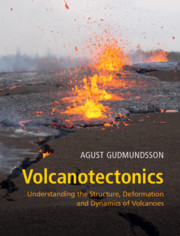Book contents
- Volcanotectonics
- Volcanotectonics
- Copyright page
- Contents
- Preface
- Acknowledgements
- 1 Introduction
- 2 Volcanotectonic Structures
- 3 Volcanotectonic Deformation
- 4 Volcanic Earthquakes
- 5 Volcanotectonic Processes
- 6 Formation and Dynamics of Magma Chambers and Reservoirs
- 7 Magma Movement through the Crust: Dike Paths
- 8 Dynamics of Volcanic Eruptions
- 9 Formation and Evolution of Volcanoes
- 10 Understanding Unrest and Forecasting Eruptions
- Book part
- Index
- References
3 - Volcanotectonic Deformation
Published online by Cambridge University Press: 18 April 2020
- Volcanotectonics
- Volcanotectonics
- Copyright page
- Contents
- Preface
- Acknowledgements
- 1 Introduction
- 2 Volcanotectonic Structures
- 3 Volcanotectonic Deformation
- 4 Volcanic Earthquakes
- 5 Volcanotectonic Processes
- 6 Formation and Dynamics of Magma Chambers and Reservoirs
- 7 Magma Movement through the Crust: Dike Paths
- 8 Dynamics of Volcanic Eruptions
- 9 Formation and Evolution of Volcanoes
- 10 Understanding Unrest and Forecasting Eruptions
- Book part
- Index
- References
Summary
Polygenetic volcanoes, to a first approximation, behave as is they are elastic. When subject to loading such as magmatic excess pressure in a chamber or overpressure in a dike, the volcano deformation is, so long as the loading is small, roughly linear elastic. When related to pressure changes in the source chamber, the measured deformation is referred to as inflation when the volcano surface rises (during magma-pressure increase) and as deflation when the surface falls or subsides (during magma-pressure decrease). If the loading generates stresses that reach the strength of the rock, then fractures form or reactivate. Slip on shear fractures, that is, faults, commonly triggers earthquakes, which can be used to monitor the state of stress in the volcano as well as magma movement through dike or sheet propagation. Some stresses are sufficiently large to form or reactivate the boundary faults of grabens or the ring-faults of collapse calderas. Similarly, the stresses may result in lateral or sector collapses, that is, landslides. The earthquake activity in volcanoes is treated in Chapter 4, and vertical and lateral collapses in Chapter 5.
- Type
- Chapter
- Information
- VolcanotectonicsUnderstanding the Structure, Deformation and Dynamics of Volcanoes, pp. 87 - 178Publisher: Cambridge University PressPrint publication year: 2020

